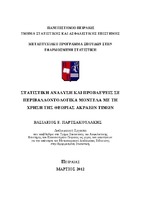Στατιστική ανάλυση και προβλέψεις σε περιβαλλοντολογικά μοντέλα με τη χρήση της θεωρίας ακραίων τιμών

Master Thesis
Συγγραφέας
Παρτσακουλάκης, Βασίλειος Ε.
Ημερομηνία
2012-10-24Επιβλέπων
Μπούτσικας, ΜιχαήλΠροβολή/
Θεματική επικεφαλίδα
Meteorology -- Statistical methods ; Statistical weather forecasting ; Extreme value theory ; Στατιστική ανάλυσηΠερίληψη
Τα τελευταία χρόνια, η συμβολή της θεωρίας ακραίων τιμών στην πρόβλεψη και πρόληψη ακραίων περιβαλλοντολογικών φαινομένων είναι καίρια, με ότι αυτό συνεπάγεται στην πρόληψη τεράστιων φυσικών και οικονομικών καταστροφών. Κύριοι στόχοι της παρούσας διπλωματικής εργασίας είναι (α) η παρουσίαση στατιστικών μεθόδων που βασίζονται στη θεωρία ακραίων τιμών, οι οποίες είναι κατάλληλες για την στατιστική ανάλυση ακραίων περιβαλλοντολογικών δεδομένων, και (β) η εφαρμογή τους χρησιμοποιώντας πραγματικά δεδομένα από τον Ελλαδικό χώρο. Αρχικά, παρατίθενται τα βασικά πιθανοθεωρητικά αποτελέσματα της θεωρίας ακραίων τιμών καθώς και η μέθοδος στατιστικής ανάλυσης ακραίων παρατηρήσεων που βασίζεται στα μέγιστα κλάσεων των δεδομένων (Block Maxima) για στάσιμες παρατηρήσεις (Κεφάλαια 1, 2). Στη συνέχεια αναλύονται οι βασικές ιδιαιτερότητες που παρουσιάζουν τα περιβαλλοντολογικά ακραία δεδομένα, όπως η τοπική εξάρτηση των παρατηρήσεων, η περιοδικότητα και η τάση, και στη συνέχεια προτείνονται τρόποι μοντελοποίησης τους στα πλαίσια της θεωρίας ακραίων τιμών, μέσω της μεθόδου Block Maxima (Κεφάλαιο 3). Ακολούθως, γίνεται εμπειρική αξιολόγηση της μεθόδου Block Maxima που αναπτύχθηκε για τη μοντελοποίηση των περιβαλλοντολογικών δεδομένων, η οποία λαμβάνει υπόψη τυχόν περιοδικότητα και τάση στις παρατηρήσεις (Κεφάλαιο 4). Στο Κεφάλαιο 5, πραγματοποιείται στατιστική ανάλυση περιβαλλοντολογικών δεδομένων με βάση τη θεωρία και τις μεθόδους που αναπτύχθηκαν στα προηγούμενα κεφάλαια . Συγκεκριμένα, αναλύονται οι μέγιστες βροχοπτώσεις σε 21 μετεωρολογικούς σταθμούς του Ελλαδικού χώρου για μια χρονική περίοδο 50 ετών καθώς και οι μέγιστες θερμοκρασίες σε 18 μετεωρολογικούς σταθμούς για την ίδια χρονική περίοδο. Οι εκτιμήσεις των παραμέτρων των μοντέλων όπως και η εκτίμηση της μηνιαίας στάθμης απόδοσης για 10 και 50 έτη επιτυγχάνεται με τη βοήθεια του στατιστικού πακέτου R. Τέλος παρουσιάζονται ποιοτικά συμπεράσματα για την μέθοδο που χρησιμοποιήθηκε και ποσοτικά συμπεράσματα για τις μέγιστες βροχοπτώσεις και θερμοκρασίες.


